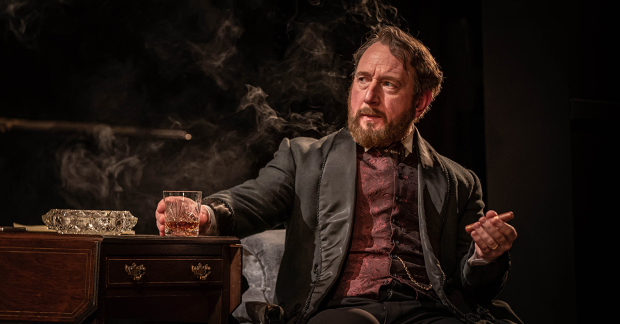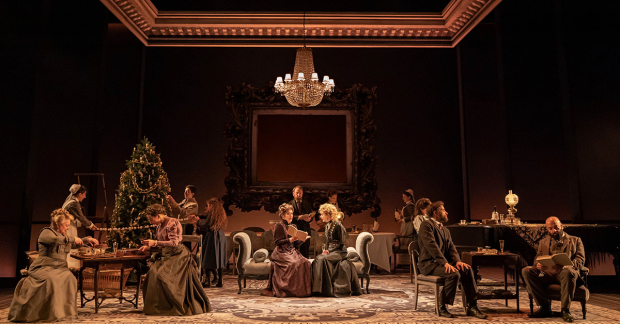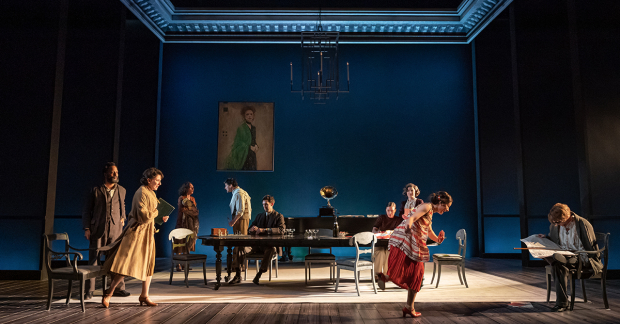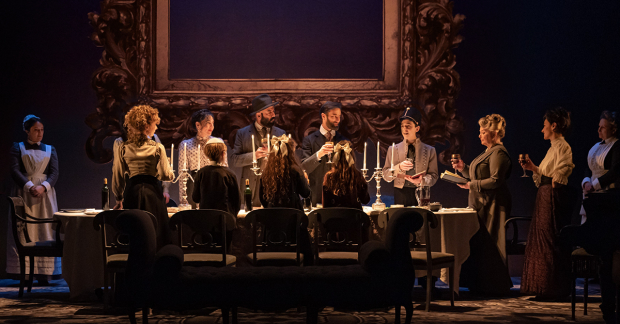Was Tom Stoppard's Leopoldstadt a showstopper with the critics?
The world premiere runs in the West End with a 41-strong cast

© Marc Brenner
Sarah Crompton, WhatsOnStage
★★★★
"It's a world contained in a single room. Because this is a play by Tom Stoppard, the sweep of the work – brilliantly captured in Richard Hudson's stylised setting which moves from a suggestion of ornate grandeur to bleak decay – encompasses the setting up of the Jewish state, the intellectual life of Vienna, mathematics and the dream theory of Freud."
"It's held together by other themes too, not least what it is to be Jewish. In the opening sections, Hermann, the sophisticated head of the factory, played with extraordinary charismatic sensitivity by Adrian Scarborough, registering each flicker of feeling and thought down 40 years of his character's life, is full of pride and hope about his assimilation by society. He has converted, has married the Catholic Gretl (another wonderful tensile performance down many years by Faye Castelow) and his son Jacob has been baptised and circumcised on the same day. The play shows the limits of that assimilation and asks why that is, stretching its arguments into ways that ask questions about tolerance and prejudice down the years."
"It's an evening that leaves many people in tears. It left me profoundly moved but also full of thought and understanding. If it is Stoppard's last play, as he seems to imply, it is a very fine testament to all he has given and all he has learnt."

© Marc Brenner
Dominic Cavendish, The Telegraph
★★★★
"So here it is. Stoppard's last play. Very possibly. Britain's greatest living dramatist has said that Leopoldstadt is likely to be the end of the road – given his age (82) and how long it takes him to write. Almost every major work he has produced since he burst onto the scene with his Hamlet spin-off Rosencrantz and Guildenstern Are Dead in 1966 has been met with high anticipation."
"In tracing the fortunes of two fictional Viennese families – Merz and Jakobovicz – connected by marriage, decimated by the nightmare of Nazism in the wake of the 1938 Anschluss, the evening moves into ever darker terrain. There are absences where once there were people, dead-ends instead of promising futures. We know of course how many millions got caught up in the tragedy; Stoppard gives that incalculable human catastrophe a domestic dimension and brings it home in more ways than one."
Tim Bano, The Stage
★★★★
"Whatever has been said of Stoppard's work in the past, very little of it applies to Leopoldstadt. The play is personal, linked closely to his own family history. It is simple, following one family over five decades. And it is deeply, achingly moving."
"Patrick Marber, who guided us so supremely through the 2016 revival of Stoppard's Travesties, doesn't really let anything get in the way of the stream of words. In fact, long stretches of this play bear down with unremitting outmodedness: two people, opposing views, long speeches. For a play about the reality of history, its closeness and our shared humanity, there are many moments when the setup doesn't embody that, whether it's the arch acting or the starched period costumes, sumptuous but distancing. Creaks and stiffness slow the play like old bones."
"Scarborough is a highlight as he summons arrogance and pride at how far the family has come from the notorious Leopoldstadt ghetto. 'My grandfather wore a kaftan, my father went to the opera in a top hat, and I have the singers to dinner,' he crows in delight, not that that social ascent matters when the police knock at the door."

© Marc Brenner
Arifa Akbar, The Guardian
★★★
"Here is his Jewish play – not directly based on Stoppard's family, but he says it's his most personal play and perhaps his last. As such, there is something momentous about Leopoldstadt, which has the weight and majesty of a final drama. It is grand, contemplative and elegiac with a cast of more than 20 and a historical sweep across six decades."
"Hermann (Scarborough) is particularly well-drawn alongside his wife, Gretl (Castelow). When there is drama rather than debate, it is arresting – such as a powerful house repossession scene and an infidelity that has long-term consequences. The off-stage action has a searing effect thanks to Adam Cork's sound design, from the smashing of glass that signifies Kristallnacht to the screeching of fighter planes and stomping of boots."
Clive Davis, The Times
★★
"In Leopoldstadt, named after the district that was once a centre of Jewish life in Vienna, he turns his attention to the Holocaust. The result is a multi-generational saga which, for all its opulent staging, becomes faintly generic. Marber's production delivers a series of sepia tableaux, all handsomely mounted by the designer Hudson and full of children and servants, but no truly memorable characters."
"The final scene, a roll-call of the dead, is unforgettably poignant in its simplicity.
"The rest gives the impression that the playwright has not found a way of turning his research into genuinely engaging conversation. The actors declaim in overly bright voices. The chronological sweep — the action opens in 1899 and ends in 1955 — means the parade of characters, some 40 in all, grows overwhelming."

© Marc Brenner
Paul Taylor, The Independent
"The new piece promptly establishes itself as magnificent at its first outing in a production by Marber.
"It does haunting justice to the variousness of its humanity. And thanks to the director's masterly feel for how to play around with the painterly and the musical aspects of a production, it manages to take you on a shiveringly sensual journey through the decades of the terrible 20th century.
"This is a personal play of a most unusual and generous kind, a way of facing up to the implications of the 'charmed life' that the dramatist believes himself to have led since 1939 when his family (who lived in Moravia – which is now part of the Czech Republic) fled the Nazis and moved to Singapore."
"The stunningly talented young actor Luke Thallon plays two antithetical parts. He is Fritz, the sexually conceited lieutenant who has been vigorously making love to Gretl (Castelow), wife of the unsuspecting Hermann, most afternoons when she is officially out of the house having her portrait painted."
Ben Brantley, New York Times
"The image of a hand-printed family tree is prominent in Leopoldstadt, among the black-and-white projections and photographs that hover evanescently between scenes. For the record, it is not Stoppard's family that is portrayed in the play, but a prosperous fictional Austrian clan in Vienna."
"The group assembled before us may represent a sort of cosmopolitan melting pot, in which conversation touches on the latest play by Schnitzler, the painting of Klimt (for whom Gretl is posing), higher mathematics and the theories of Freud (this is a Stoppard play).
"But as Hermann speaks of his hopes for future social and professional advancement, you sense insecurity pricking at his complacency (an uneasiness that is subtly and expertly conveyed by Scarborough, in the show's most fully realised portrait)."
"More than any previous Stoppard play — including the sprawling Coast of Utopia trilogy, a nine-hour dive into the Russian Revolution — Leopoldstadt is a group portrait, and one of uncommon density. (You will probably feel the need to consult the family tree in the program.) The 40-strong cast is, to a person, very good, and they embody their characters with spiky defining detail."




















